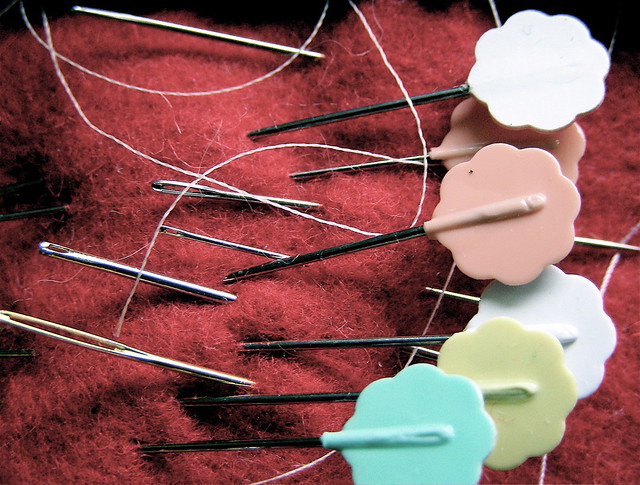Words for spin, twist, turn and related things in Celtic languages.
Words marked with a * are reconstructions.
| Proto-Celtic | *snīmus = spinning, weaving *sniyeti = to turn, twist |
|---|---|
| Old Irish (Goídelc) | sníïd = to twist sním = spinning, twisting, vexation grief, anxiety |
| Middle Irish (Gaoidhealg) | sníïd, sníit = to twists, bend, tie, contend, struggle, grieve, trouble, vex sním, snim = twisting, bending, shaping, trouble, care, grief, anxiety snímaid = to spin, twist |
| Irish (Gaeilge) | sníomh [ʃnʲiːvˠ/ʃnʲiːw] = spinning, twisting, twinning, struggle, strain, wrench, cre, anxiety; to spin, twist, strain, wrench, strive, struggle sníomhach = spinning, turning, twisting, anxious, concerned sníomhachán = (act of) spinning sníomhadán = spinneret sníomhaí = spinner sníomhaire = spindle |
| Scottish Gaelic (Gàidhlig) | snìomh [ʃn̪ʲĩə̃v] = spinning, winding, wreathing, twisting, twining, twist, curl, sprain, wrench snìomhach [ʃn̪ʲiəvəx] = twisting, winding, spiral, tortuous, twisted snìomhachan [ʃn̪ʲəvəxan] = spinner (implement) snìomhadh [ʃn̪ʲĩə̃vəɣ] = spinning, winding, wreathing, twising snìomhaire [ʃn̪ʲiəvərʲə] = borer, auger, spinner snìomhte [ʃn̪ʲĩə̃vdʲə] = spin, entwined, twisted |
| Manx (Gaelg) | snee = crossness, offence, vexation sneeu = spin, spinning queeyl sneeuee = spinning wheel sneeuder = spinner |
| Proto-Brythonic | *nɨðid = (?) |
| Middle Welsh (Kymraec) | nydd = spin, twist, perverseness, obstinacy, agitation, difficulty nydu [ˈnəðɨ/ˈnəði] = to spin (wool), twist, wind |
| Welsh (Cymraeg) | nydd [nɨːð/niːð] = spin, twist, perverseness, obstinacy, agitation, difficulty, honeysuckle, spun nyddu [ˈnəðɨ/ˈnəði] = to spin (wool), twist, wind nydd(i)wr = spinner, spinning-machine, nightjar, grasshopper warbler nyddlin = a spiral |
| Middle Cornish (Cernewec) | nedhe, nedhé = to spin, turn, twist |
| Cornish (Kernewek) | nedha = to twist |
| Middle Breton (Brezonec) | nezaff = to spin, trick, fool, purr |
| Breton (Brezhoneg) | nez = twist, twisting nezadenn = spun thing nezadur = wiring nezañ [ˈneː(z)ã] = to spin, trick, fool, purr nezer = spinner nezerezh = spinning |
Etymology: from Proto-Indo-European *(s)neh₁- (to spin, sew). Words from the same roots include needle, snood in English, naald (needle, pin) in Dutch, nähen (to sew) in German, snáth (thread, yarn, web) in Irish, and possibly snop (sheaf) in Czech [source].
See also the Pins & Needles post for some Celtic words related to needles, pins and thread.
| Proto-Celtic | *kassos = curly, twisted, woven |
|---|---|
| Gaulish | *kass- = twist *kassis = curly (hair) *kassanos = oak (tree/wood) |
| Old Irish (Goídelc) | cas = curly (haired) casaid = to twist, turn |
| Middle Irish (Gaoidhealg) | cas, cass = curly (hair) casaid, casaidh = to twist, bend |
| Irish (Gaeilge) | cas [kɑsˠ] = twisted, winding, curly, complicated, intricate, twisty, devious; to twist, turn, wind casadh [ˈkɑsˠə/ˈkasˠu(ː)] = to twist, turn, wind, spin, reproach |
| Scottish Gaelic (Gàidhlig) | cas [kas] = twist, bend, wind (up), gnash, oppose, turn against casadh [kasəɣ] = (act of) opposing, turning against, twisting, bending, gnashing casta [kasdə] = twisted, twined, curled, complex |
| Manx (Gaelg) | cassit = contorted, distorted, twirled, twisted cassee = coiling, twisting, winding cassey = to curl, distort, screw, spin, whirl cast = curly, curved, intricate, spun, warped, wrapped |
Etymology: possibly from Proto-Indo-European *kes- (to scrape, comb) [source]. Words from the same Proto-Celtic root, via Gaulish kassanos (oak) and Latin casnus, include casse (oak) in Occitan, cassanella (gall) in Catalan and chêne (oak) in French [source]. Words from the same PIE roots include hair in English, коса (kosa – hair) in Bulgarian, and kasa (braid) in Latvian [source].
See the Weaving Words post for some weaving-related Celtic words.
| Proto-Brythonic | *tro = (?) |
|---|---|
| Middle Welsh (Kymraec) | tro = rotation, revolution, turn(ing), stir(ing), twist, warp troat, troad, troead = rotation, revolution, orbit, turn(ing) troy, try, troi = to turn, spin |
| Welsh (Cymraeg) | tro [troː] = rotation, revolution, turn(ing), stir(ing), twist, warp, coil, ringlet tro(e)ad = rotation, revolution, orbit, turn(ing), stir(ing), twist, convolution, hinge tro(a)f, troi = to turn, spin, whirl, rotate, roll |
| Middle Cornish (Cernewec) | tro = turn, circuit, occasion, manner, sort troillia = to turn, whirl |
| Cornish (Kernewek) | tro = cycle, occasion, round, turn troyll = spiral, swirl, ceilidh troyllya = to spin, swirl troyllyek = spiral troyllyer plasennow = record player |
| Old Breton (Brethonoc) | tro = movement, turn tro(u)im = to turn, spin |
| Middle Breton (Brezonec) | tro = round, surround, surroundings treiff = to turn, move |
| Breton (Brezhoneg) | tro [troː] = round, surround, surroundings tro-dro [troˈdroː] = around, towards treiñ = to spin |
Etymology: uncertain. Possibly related to Latin torqueo (I turn) or Ancient Greek τρόπος (trópos – a turn) [source].
Sources: Wiktionary, Etymological Dictionary Of Proto Celtic, In Dúil Bélrai English – Old Irish glossary, eDIL – Electronic Dictionary of the Irish Language, Teanglann.ie, Am Faclair Beag, An etymological dictionary of the Gaelic language, Fockleyreen: Manx – English Dictionary, Online Manx Dictionary, Gaelg Corpus, Geiriadur Prifysgol Cymru, Lexicon cornu-britannicum : a dictionary of the ancient Celtic language of Cornwall, Gerlyver Kernewek, Devri : Le dictionaire diachronique du breton, Dictionaire Favereau, TermOfis









